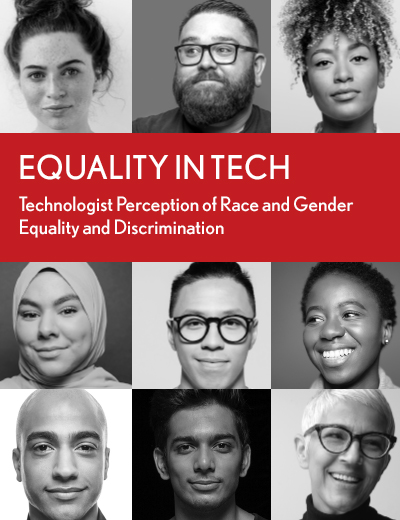
As part of Dice’s new Equality in Tech Report, we asked more than 9,000 technologists whether they’d experienced or witnessed discrimination during their careers. Their answers offer crucial insight into how racial and gender discrimination remain a problem for the technology industry.

Equality in Tech Report
Access now. No contact information and form submission required for access.
Gender Discrimination in Tech
For the purposes of our report, we defined discrimination as the practice of letting a person’s gender, race or skin color unfairly become a factor when deciding who receives a job, promotion, or other employment benefit. Discrimination is a form of social inequality.
Women are vastly more likely to believe that gender inequality occurs in the tech industry. In fact, 58 percent of technologist respondents who identified as women stated they believe discrimination occurs frequently or very frequently, compared to 31 percent of men.
When respondents were asked if they have experienced gender discrimination in the tech workplace, an even larger contrast between women and men emerged. Specifically, more than half of women respondents (57 percent) reported that they have experienced some form of gender discrimination, drastically outnumbering the number of men respondents who said the same (10 percent).
It’s also worth noting that gender discrimination is likely underreported in the workplace, since many are afraid that speaking out could have a negative impact on their performance reviews and careers. In turn, that could impact what both men and women experience and witness when it comes to discrimination within their organizations.
When it comes to the types of discrimination witnessed in the tech industry, the data reveals significant differences between men and women. More than half of women respondents (53 percent) stated that they’ve witnessed discrimination in salary or benefits, compared to only a quarter of men who said the same (24 percent).
Discrimination is also perceived as a factor when it comes to opportunities for career advancement. Specifically, 47 percent of women respondents said they’ve witnessed discrimination with leadership opportunities, 45 percent with promotional opportunities and 32 percent with project opportunities – more than double each respective response from male respondents. In an especially concerning development, 48 percent of women respondents said they’ve witnessed discrimination with regard to their technical abilities (in contrast, 24 percent of men respondents said the same). When it comes to technical careers, the perception that someone lacks tech skills can easily prevent them from obtaining vital jobs and promotions.

